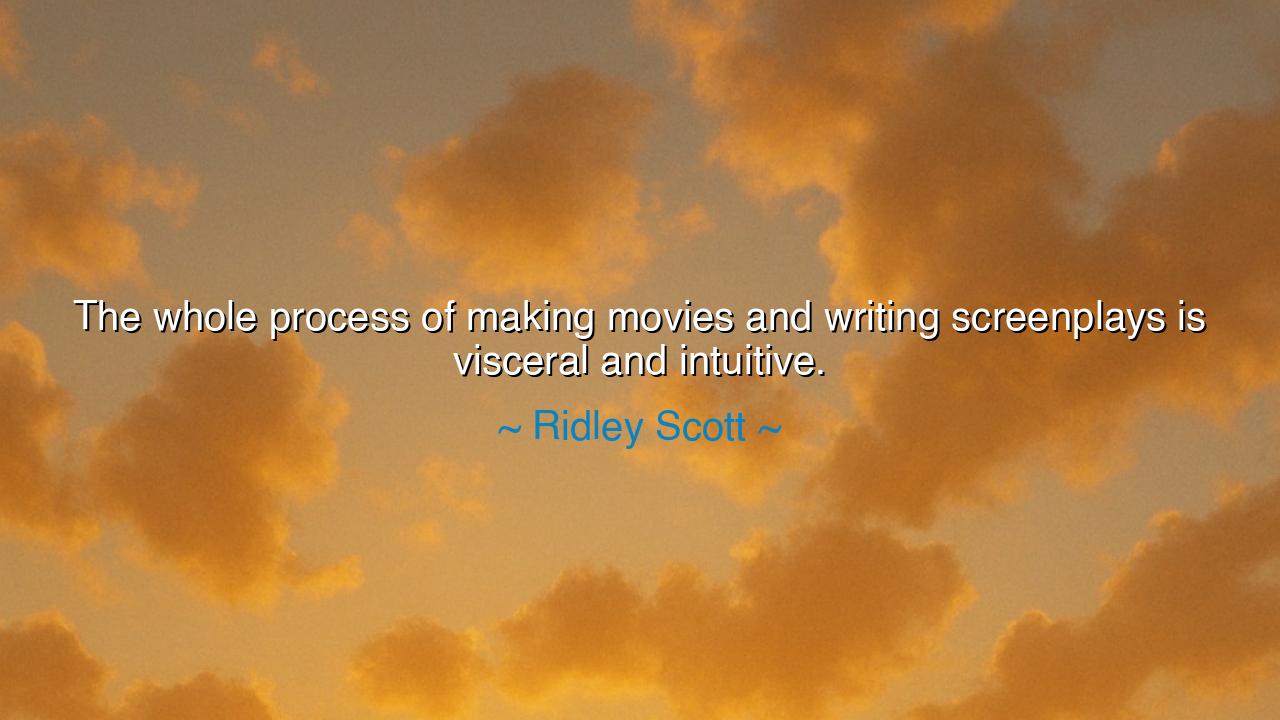
The whole process of making movies and writing screenplays is






When Ridley Scott declared, “The whole process of making movies and writing screenplays is visceral and intuitive,” he spoke as a master of his craft who understood that the greatest works of art are not born solely from calculation, but from the deep wellsprings of instinct. His words carry the weight of a truth known since the dawn of storytelling: that creation is not merely the labor of the mind, but the expression of the heart, the senses, and the unspoken stirrings of the spirit.
At the core of his statement lies the idea of the visceral—that which strikes directly at the body and soul. To be visceral is to bypass reason, to reach for the raw and immediate, to feel one’s way forward in the dark of uncertainty. In filmmaking, this means that the image, the sound, the movement of actors, and the rhythm of dialogue must first be felt before they can be refined. A great film is not an essay, but a pulse; it must stir the viewer’s heart before it engages the intellect.
Alongside the visceral lies the intuitive. Intuition is that quiet guide that whispers truth before the mind can prove it. It is the same force that guided ancient navigators across uncharted seas, sensing currents and winds beyond measure. So too does the filmmaker trust his intuition, knowing when a scene breathes with life or when a line of dialogue rings hollow. For Ridley Scott—who gave the world Blade Runner, Alien, and Gladiator—these instincts are not accidents but cultivated powers, sharpened through years of listening to his own inner compass.
History itself testifies to the power of intuition in creation. Consider Mozart, who confessed that his compositions often came to him whole, not through calculation but through sudden clarity of feeling. Or recall the cave painters of Lascaux, whose images of animals, drawn in firelit caverns tens of thousands of years ago, were not born of theory but of instinctive reverence and fear. These works endure because they bypass analysis and speak to something deeper, something elemental in the human heart.
The lesson, O seekers of truth, is that in the act of creation—whether in art, in leadership, or in daily living—do not rely solely on reason. Reason is a fine tool, but it is not the only one. Trust also the wisdom of the body, the quiet voice of intuition, the stirring of your spirit when something feels alive. To create only with calculation is to craft works that may be precise but lifeless. To create with intuition is to breathe fire into form, to shape something that beats with the rhythm of life itself.
Practical action lies before you: cultivate your intuition. Listen to your instincts when you write, when you speak, when you act. Pay attention to the moments when your heart stirs, when your breath quickens, when a decision feels right even before it is explained. At the same time, hone your senses—watch films, read widely, live deeply—for intuition grows strong only when it is fed by experience. And when you create, let the visceral guide you first, then let reason refine what instinct has revealed.
Therefore, let Ridley Scott’s words stand as a commandment for all creators: trust the visceral, honor the intuitive. Do not be afraid of the rawness of feeling, for it is the lifeblood of art. Do not dismiss the whispers of instinct, for they are the compass of the soul. Whether you make movies, write stories, or craft the tale of your own life, remember this: the greatest works are not calculated—they are felt. And what is felt deeply by the maker will be felt deeply by the world.






AAdministratorAdministrator
Welcome, honored guests. Please leave a comment, we will respond soon